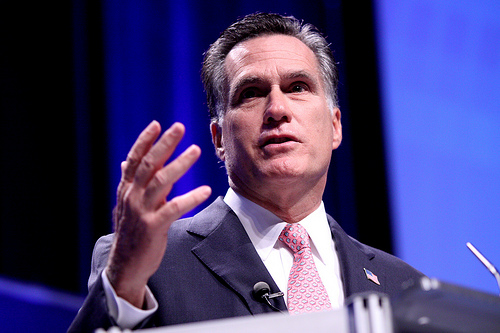Candidates Look Forward To Bipartisan Battle For Latino Vote

GOP candidates have long found themselves in an unenviable position when it comes to gaining the favor of the minority vote. Analysts say that given a dramatic shift in American demographics over the last several years, the 2012 election will likely come down to courting the Latino vote. Unfortunately for the GOP, the party’s policies regarding immigration reform stand in direct opposition to the priorities of that growing segment of the population.
“That’s the razor’s edge they’re trying to balance on,” said Gary Segura, a professor of political science at Stanford University and principal at national polling firm Latino Decisions.
“On the one hand, they have to appeal to nativists, folks who have ethnocentric views on what America should look like. And for all of those folks, they have to appear very tough on immigration, English-only—the meaner the better,” Segura said. “On the other hand, they’ll become increasingly uncompetitive in states like Nevada, Colorado, New Mexico, Florida, and even eventually places like Arizona and Texas if they keep driving Latinos away.”
Republican frontrunners Mitt Romney and Newt Gingrich appeared well aware of that obstacle as they entered Tuesday’s primary in Florida. While Gingrich made his play for the Cuban vote, Romney began talking up Puerto Rican statehood to win over that segment of the Latino population.
Gingrich even released a Spanish-language ad Sunday likening the Obama status quo to restrictions on citizens’ freedoms in Cuba.
Blasted as over-the-top, the spot may have been too much for voters to take seriously. Romney pulled ahead Tuesday, easily securing 46 percent of the vote over Gingrich’s 32 percent.
But while Florida is considered a “winner-take-all” primary, political analysts have pointed out the state’s positive reception this week may not be indicative of things to come. Much of that disparity comes down to Florida’s atypical Latino population.
About one in every 10 Republican primary voters in Florida are Latino, due in large part to the state’s old and conservative Cuban community.
But according to 2010 U.S. Census data, Cubans only make up roughly 4 percent of the nation’s Latino population. Mexicans account for 63 percent atop Puerto Ricans’ distant second at 9 percent.
According to the Pew Research Center, 6.6. million Latinos across the country participated in last year’s midterm elections, making up 6.9 percent of voters. That sample was enough of a draw to attract the attention of the GOP—but only when absolutely necessary, it seems.
While Gingrich and Romney have both ramped up efforts in publicly courting the Latino vote, comments made during the Jan. 23 debate in Tampa could potentially undo all their hard pandering work. The candidates voiced support for doing away with bilingual ballots, violating 1975 language provisions set in the federal Voting Rights Act.
The proposed move would disenfranchise a huge segment of the country’s population, especially in California, where Latinos make up nearly 38 percent with 14 million people.
And it wouldn’t just alienate those Latinos brand new to the country. “There are voters to whom the language provisions would apply who don’t have a recent immigration experience,” Segura said. “As you move across generations, it’s not an issue. The second generation, who have gone to school in English in the United States, will overwhelmingly use the English-language ballot material. But foreign-born, even if they’ve mastered English, are going to be more comfortable in Spanish.”
At odds with the Cuban example in Florida, Segura pointed out, younger Hispanics in the U.S. are more likely to register as Democrats. And can they see through the GOP’s flip-flopping attempts to win them over?
“Oh, absolutely,” Segura said. He cited a January poll that found Latino voters favored President Obama over both Gingrich and Romney 3 to 1. “I mean, literally the president is just crushing his opponents among Latinos right now.”
That kind of consensus is significant given Latinos’ perception of inaction on Obama’s part to reform immigration policy. The president won two-thirds of their vote in 2008, but since then he’s lost much of that support by failing to find a way to secure legal status for the country’s 11 million undocumented immigrants.
Immigration advocates were encouraged last month by Obama’s most recent proposal. The president suggested ending a requirement placed on undocumented immigrants with parents or spouses in the U.S. that forced them to leave the country before filing paperwork to stave off deportation “on the grounds of family hardship.” Groups like the National Council of La Raza celebrated the move, but Segura said it’s hard to say how that progress will play out in November.
“We don’t know what it’ll look like on Election Day,” Segura said, “but it’s possible Obama will do better in 2012 than in 2008. That’s how bad the Republican candidates are performing.”
According to Jan. 7, Obama will need to achieve a similar degree of approval from Latino voters in swing states like Nevada, New Mexico, Colorado and Florida. And though the Hispanic population may still be dissatisfied with the president’s progress, Segura said he might just be the lesser of two evils in the general election.
“Obama might come off as, you know, deporting too many people and being ineffective in moving for his immigration reform and all these other things,” he said. “But when they compare it to the alternative, two guys who have the idea of abolishing bilingual ballots or who believe self-deportation is a reasonable immigration policy, then Obama looks like the Dalai Lama.”
Segura said as long as Democrats controlled any branch of government, Section 203 of the Voter Rights Act blocking imposed language barriers would remain intact. Further, he said, the GOP’s most recent thoughts on the bilingual ballot could only help maintain that dynamic.
“As usual,” Segura continued, “the best ‘get out the vote’ operation for the Democrats among Latinos is using the words and attitudes of the Republican candidates.”



